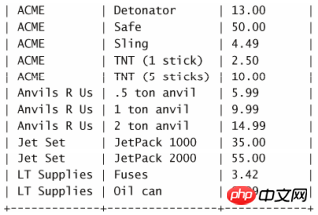How to create a join using mysql statement
为什么要使用联结
正如所述,分解数据为多个表能更有效地存储,更方便地处理,并且具有更大的可伸缩性。但这些好处是有代价的。
如果数据存储在多个表中,怎样用单条 SELECT 语句检索出数据?
答案是使用联结。简单地说,联结是一种机制,用来在一条 SELECT语句中关联表,因此称之为联结。使用特殊的语法,可以联结多个表返回一组输出,联结在运行时关联表中正确的行。
维护引用完整性 重要的是,要理解联结不是物理实体。换句话说,它在实际的数据库表中不存在。联结由MySQL根据需要建立,它存在于查询的执行当中。
在使用关系表时,仅在关系列中插入合法的数据非常重要。回到这里的例子,如果在 products 表中插入拥有非法供应商ID(即没有在 vendors 表中出现)的供应商生产的产品,则这些产品是不可访问的,因为它们没有关联到某个供应商。
为防止这种情况发生,可指示MySQL只允许在 products 表的供应商ID列中出现合法值(即出现在 vendors 表中的供应商)。
这就是维护引用完整性,它是通过在表的定义中指定主键和外键来实现的。
创建联结
联结的创建非常简单,规定要联结的所有表以及它们如何关联即可。请看下面的例子:
输入:
select vend_name,prod_name,prod_price from vendors,products where vendors.vend_id= products.vend_id order by vend_name,prod_name;
输出:


分析:我们来考察一下此代码。 SELECT 语句与前面所有语句一样指定要检索的列。这里,最大的差别是所指定的两个列( prod_name和 prod_price )在一个表中,而另一个列( vend_name )在另一个表中。
现在来看 FROM 子句。与以前的 SELECT 语句不一样,这条语句的 FROM子 句列出了两个表,分别是 vendors 和 products 。它们就是这条 SELECT语句联结的两个表的名字。这两个表用 WHERE 子句正确联结, WHERE 子句指示MySQL匹配 vendors 表中的 vend_id 和 products 表中的 vend_id 。
可 以 看 到 要 匹 配 的 两 个 列 以 vendors.vend_id 和 products.vend_id 指定。这里需要这种完全限定列名,因为如果只给出 vend_id ,则MySQL不知道指的是哪一个(它们有两个,每个表中一个)。
完全限定列名 在引用的列可能出现二义性时,必须使用完全限定列名(用一个点分隔的表名和列名)。如果引用一个没有用表名限制的具有二义性的列名,MySQL将返回错误。
【相关推荐】
1.什么是mysql子查询?如何利用子查询进行过滤?
2.mysql创建计算字段使用子查询
3.mysql中什么是联结和关系表?
4.MySQL中WHERE子句重要性和如何联结多个表
The above is the detailed content of How to create a join using mysql statement. For more information, please follow other related articles on the PHP Chinese website!

Hot AI Tools

Undresser.AI Undress
AI-powered app for creating realistic nude photos

AI Clothes Remover
Online AI tool for removing clothes from photos.

Undress AI Tool
Undress images for free

Clothoff.io
AI clothes remover

Video Face Swap
Swap faces in any video effortlessly with our completely free AI face swap tool!

Hot Article

Hot Tools

Notepad++7.3.1
Easy-to-use and free code editor

SublimeText3 Chinese version
Chinese version, very easy to use

Zend Studio 13.0.1
Powerful PHP integrated development environment

Dreamweaver CS6
Visual web development tools

SublimeText3 Mac version
God-level code editing software (SublimeText3)

Hot Topics
 When might a full table scan be faster than using an index in MySQL?
Apr 09, 2025 am 12:05 AM
When might a full table scan be faster than using an index in MySQL?
Apr 09, 2025 am 12:05 AM
Full table scanning may be faster in MySQL than using indexes. Specific cases include: 1) the data volume is small; 2) when the query returns a large amount of data; 3) when the index column is not highly selective; 4) when the complex query. By analyzing query plans, optimizing indexes, avoiding over-index and regularly maintaining tables, you can make the best choices in practical applications.
 Explain InnoDB Full-Text Search capabilities.
Apr 02, 2025 pm 06:09 PM
Explain InnoDB Full-Text Search capabilities.
Apr 02, 2025 pm 06:09 PM
InnoDB's full-text search capabilities are very powerful, which can significantly improve database query efficiency and ability to process large amounts of text data. 1) InnoDB implements full-text search through inverted indexing, supporting basic and advanced search queries. 2) Use MATCH and AGAINST keywords to search, support Boolean mode and phrase search. 3) Optimization methods include using word segmentation technology, periodic rebuilding of indexes and adjusting cache size to improve performance and accuracy.
 Can I install mysql on Windows 7
Apr 08, 2025 pm 03:21 PM
Can I install mysql on Windows 7
Apr 08, 2025 pm 03:21 PM
Yes, MySQL can be installed on Windows 7, and although Microsoft has stopped supporting Windows 7, MySQL is still compatible with it. However, the following points should be noted during the installation process: Download the MySQL installer for Windows. Select the appropriate version of MySQL (community or enterprise). Select the appropriate installation directory and character set during the installation process. Set the root user password and keep it properly. Connect to the database for testing. Note the compatibility and security issues on Windows 7, and it is recommended to upgrade to a supported operating system.
 Difference between clustered index and non-clustered index (secondary index) in InnoDB.
Apr 02, 2025 pm 06:25 PM
Difference between clustered index and non-clustered index (secondary index) in InnoDB.
Apr 02, 2025 pm 06:25 PM
The difference between clustered index and non-clustered index is: 1. Clustered index stores data rows in the index structure, which is suitable for querying by primary key and range. 2. The non-clustered index stores index key values and pointers to data rows, and is suitable for non-primary key column queries.
 MySQL: Simple Concepts for Easy Learning
Apr 10, 2025 am 09:29 AM
MySQL: Simple Concepts for Easy Learning
Apr 10, 2025 am 09:29 AM
MySQL is an open source relational database management system. 1) Create database and tables: Use the CREATEDATABASE and CREATETABLE commands. 2) Basic operations: INSERT, UPDATE, DELETE and SELECT. 3) Advanced operations: JOIN, subquery and transaction processing. 4) Debugging skills: Check syntax, data type and permissions. 5) Optimization suggestions: Use indexes, avoid SELECT* and use transactions.
 Explain different types of MySQL indexes (B-Tree, Hash, Full-text, Spatial).
Apr 02, 2025 pm 07:05 PM
Explain different types of MySQL indexes (B-Tree, Hash, Full-text, Spatial).
Apr 02, 2025 pm 07:05 PM
MySQL supports four index types: B-Tree, Hash, Full-text, and Spatial. 1.B-Tree index is suitable for equal value search, range query and sorting. 2. Hash index is suitable for equal value searches, but does not support range query and sorting. 3. Full-text index is used for full-text search and is suitable for processing large amounts of text data. 4. Spatial index is used for geospatial data query and is suitable for GIS applications.
 The relationship between mysql user and database
Apr 08, 2025 pm 07:15 PM
The relationship between mysql user and database
Apr 08, 2025 pm 07:15 PM
In MySQL database, the relationship between the user and the database is defined by permissions and tables. The user has a username and password to access the database. Permissions are granted through the GRANT command, while the table is created by the CREATE TABLE command. To establish a relationship between a user and a database, you need to create a database, create a user, and then grant permissions.
 Can mysql and mariadb coexist
Apr 08, 2025 pm 02:27 PM
Can mysql and mariadb coexist
Apr 08, 2025 pm 02:27 PM
MySQL and MariaDB can coexist, but need to be configured with caution. The key is to allocate different port numbers and data directories to each database, and adjust parameters such as memory allocation and cache size. Connection pooling, application configuration, and version differences also need to be considered and need to be carefully tested and planned to avoid pitfalls. Running two databases simultaneously can cause performance problems in situations where resources are limited.






